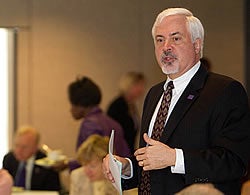Trustees: ECU must prepare for cuts

Dr. Rick Niswander, interim vice chancellor for administration and finance, speaks during the ECU board of trustees budget meeting Thursday, Feb. 24. Photo by Cliff Hollis
GREENVILLE, N.C. — East Carolina University needs to prepare for stressful changes as the state legislature eyes a budget that sharply shrinks government, members of the board of trustees said today in a budget update and discussion.
“It comes down to we’re going to have to do some uncomfortable things, such as eliminate some schools and ask students to pay,” said trustee Bob Greczyn.
The budget discussion and overview, part of two days of trustee meetings on campus, echoed the uncertainty that surrounds higher education funding for the next two years as state lawmakers in Raleigh look for ways to overcome an estimated $2.6 billion budget shortfall.
“Our job is to be as rational as possible about how we navigate this budget,” said trustee Joel Butler.
Gov. Beverly Perdue’s proposed budget would reduce spending by 9.5 percent yet provide universities money to fund their enrollment growth, along with increases in financial aid. It also includes $5 million to open and operate ECU’s School of Dental Medicine now under construction.
Yet observers expect the final budget approved by the General Assembly to reduce spending more sharply.
“We have to be prepared for a base budget cut of up to 15 percent, but we will hope for one closer to 10 percent,” Chancellor Steve Ballard told trustees.
Ballard outlined for trustees the four budget-cutting priorities he rolled out to students, faculty and staff Feb. 2 in his State of the University speech: find efficiencies; use university reserves to protect the academic core; ask each college and division to cut a percentage of the base budget cut; and ask students to pay more by raising tuition.
Efficiencies won’t produce much savings, Ballard said, because, in five years of reducing budgets, the university has already made the cuts that are easy.
“We have to look now at academic efficiencies,” Ballard said. “It’s the one thing we haven’t done.”
It’s reasonable to expect some departments and areas to lose their independence, Ballard said, and the university is working on scenarios along those lines.
“It will be a long time before we have any kind of proposal,” he said.
Should state budget cuts go as high as 15 percent, Ballard told trustees he expected ECU to spend between one-third and two-thirds of its emergency reserves to protect what he called “the university’s core assets.”
ECU sets money aside for dire and unexpected expenses such as natural disasters. It tapped those funds in 1999 in the wake of catastrophic flooding from Hurricane Floyd that closed the campus for two weeks.
“I don’t want to go above 50 percent in the emergency fund,” Ballard said. “It would be irresponsible to spend that down.”
Some trustees said spending as much as 50 percent puts the university at risk.
“I would not want to spend more than one-third of the emergency fund,” said trustee William Bodenhamer Jr.
“I would move the emergency fund back to No. 3 on this list (of strategies) as opposed to No. 2,” added trustee Ken Chalk.
Ballard said campus-based tuition increases, approved by the board of trustees, would be equally difficult. Tuition is set to increase 34 percent increase over the next two years.
“I understand there are those around this table who may think differently, but I don’t think we can do much more than we’ve already done with tuition because of the impact on our constituency,” he said.